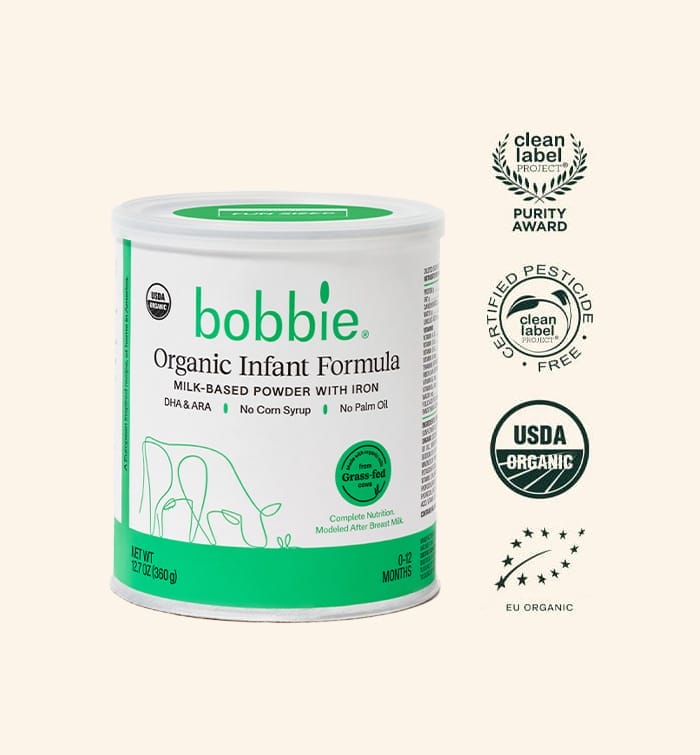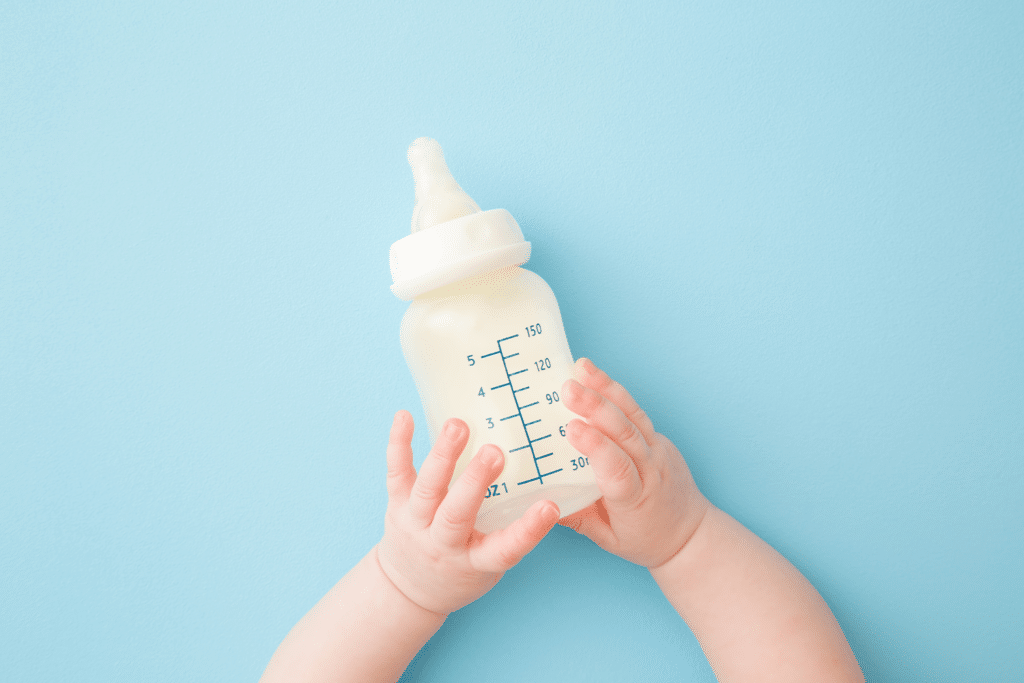We are proud to say that these posts are not sponsored. Our editorial team of Bobbie moms and writers personally select each featured product. If you buy something through our links, we may earn an affiliate commission, at no cost to you.
It happens. You’re running low on baby formula. It may be time for a store-run to restock. If your formula’s not available, you may have to consider switching formula brands. With the current formula shortage and the infant formula recall going on all at once, this is affecting so many parents across the country. We hear you and we hope that you are ok, mom. It’s a deep moment for so many of us. How can we be parents at a time when we can’t find the baby formula we need? And the bigger question is, what can we do when we can’t find infant formula at all?
Wanting to get you expert advice about what to do when you reach for the scoop and find there’s nothing left, we consulted Régine Brioché, MD, FAAP, Board certified pediatrician and Bobbie Medical Advisor. Here’s her advice.
- Can’t find baby formula due to formula recall
- What to do if you run out of baby formula
- Can you give your baby water?
- Can you give a baby Pedialyte or coconut water?
- Can you give a baby cow’s milk?
- Can I water down formula to make it last longer?
- Why water can be bad for infants:
- Emergency alternatives to baby formula:
- What to do if you run out of formula? Resources
- Making baby formula at home:
Can’t find baby formula due to formula recall
“In light of the recent formula shortage and the FDA recalls, a lot of parents are finding themselves unable to get their choice formula. My advice is dependent on the infants age,” says Dr. Brioché. “Unfortunately for all infants 6 months and under, parents will have to use/purchase a formula that is comparable to what they are presently using. For children 6-9 months who are consuming complementary foods, it is possible to work on more food exposure (with nutritionally dense solids) to reduce reliance on formula thus stretching it. Lastly, for children over 9 months who have been consuming solids regularly and should be consuming less formula, you can consider making the switch to milk (or suitable milk alternatives)— speak to your pediatrician.”
Read here for information released by the White House addressing the Infant Formula Shortage.
What to do if you run out of baby formula
The main thing is— don’t panic, and don’t beat yourself up. Running out of formula happens to even the most prepared parents.
The main issue with running out of formula is making sure your baby stays hydrated. While it may just mean their feed is delayed while you run to the store, if there’s no quick way to restock it’s important to offer them something in place of infant formula to prevent dehydration.
Dr. Brioche advises, “in the first nine months of life, hydration options are limited to breastmilk, formula, and in emergency situations, Pedialyte.”
Can you give your baby water?
While it might be tempting to give your baby water, this is not a good idea for babies under six months. Water should only be given to children aged six months and above, and even at that age a child should only have a small amount. This is because too much water upsets the electrolyte balance in a baby’s body. This can lead to brain swelling, seizures, and in extreme cases, death.1
Here are some emergency hydration options you can consider during the baby’s first year of life:
Can you give a baby Pedialyte or coconut water?
Pedialyte or coconut water could be an option depending on your baby’s age. “Coconut water is rich in carbohydrates and electrolytes such as sodium, potassium, and magnesium, but it is also high in potassium, which can lead to high potassium levels in infants with immature kidneys,” advises Dr. Brioche. “High potassium levels can cause irregular heartbeats and even death, so it should only be given in small quantities to infants over six months of age.”
Can you give a baby cow’s milk?
Cow’s milk could be an option, depending on your baby’s age. “If infants are fed formula, cow’s milk can be gradually introduced into their diet between the ages of 9 and 12 months,” advises Dr. Brioche. The American Academy of Pediatrics states that cow’s milk should not be given until your baby reaches one year of age. Only whole cow’s milk or reduced-fat (2%) cow’s milk should be offered until age 2 years when low-fat (1%) or non-fat (skim) milk can be considered.2


Shop Bobbie Organic Infant Formula
Bobbie Organic Infant Formula is a USDA Organic, EU-style infant formula that meets all FDA requirements. It is a complete nutrition milk-based powder modeled after breast milk and is easy on tummies. It is non-GMO and doesn't have corn syrup, palm oil, or maltodextrin. Learn more about Bobbie.
Can I water down formula to make it last longer?
We get it. It’s tempting. Especially during times when we find ourselves struggling financially. Adding water to your baby’s formula to make it “stretch” can seem like a good idea that will save you money, but this is extremely dangerous and you should never try this.
“Infant kidneys are not fully developed,” says Dr. Brioche. When you add water to formula, their kidneys aren’t able to process it.
Why water can be bad for infants:
- It reduces the amount of nutrients your baby gets. Infant formula is specially formulated to deliver the right amount of vitamins and nutrients your baby needs. If you water down the formula, your baby won’t get the vital nutrients they need, which can slow their growth and development.3 This can lead to poor weight gain and delayed development.
- It can lead to water intoxication. Water intoxication is a dangerous condition that leads to serious health conditions and even death.1 Because your baby’s kidneys are immature, they simply can’t process large loads of water. Giving your baby watered down formula can lower the levels of important electrolytes, especially salt.
Emergency alternatives to baby formula:
You should not water down formula or give your baby water or cow’s milk as an alternative, but what to do when you’re standing in the kitchen with a screaming, hungry baby and no formula?
The most important thing to remember is to stay calm, and get your hands on healthy infant formula as soon as possible. Water, milk alternatives, Pedialyte, and solid foods aren’t appropriate substitutes for babies. Speak to your child’s pediatrician about a suitable and safe alternative for your baby based on their health and age.

What to do if you run out of formula? Resources
If you’re having trouble finding or affording your formula, you’ve got options. Don’t water down formula or offer an alternative. There are programs available for assistance to ensure your baby has what they need to eat.

If you’re struggling, here are some places you can call for help with baby formula:
- Call your doctor or your baby’s doctor. Your OBGYN or your baby’s healthcare provider may have formula samples on hand they can offer you to hold you over until you are able to get more. This isn’t a permanent solution for your formula needs, but it’s definitely an option you can explore in a pinch.
- WIC. The federal Special Supplemental Nutrition Program for Women, Infants, and Children (WIC) program ensures that infants have their food and formula needs met. To find out if you are eligible for WIC, you can check with your county’s WIC office or contact them online.4
- SNAP. The Supplemental Nutrition Assistance Program (SNAP) offers benefits that provide food for low income families. Unlike WIC, the benefits can be used to purchase food for individuals of any age and SNAP benefits can be used to buy infant formula.5
- Food banks. Local food banks may or may not have infant formula to offer, but it’s worth checking. Even if they don’t, they may be able to provide food for your family so that you can use your money, WIC, or SNAP benefits to buy formula.
- Breast milk banks. Many areas have local breast milk banks that can offer assistance to families in need. In a pinch, you can get donor breast milk for your baby by contacting these facilities.
Making baby formula at home:
DO NOT attempt to make home-made infant formula. This can be tempting, especially if you see a recipe on the internet, but this is not safe and will not give your baby all the nutrients they need. The American Academy of Pediatrics strongly recommends against making your own formula since it is dangerous for your baby.6
Running out of baby formula isn’t the end of the world, but it is a serious issue that you’ll want to deal with as soon as possible.
Making sure you have a supply of formula for your child is important in ensuring their proper health and development.
Don’t hesitate to reach out for help if you need it to get your baby the nutrition they need!
Verified by: Morgan Leafe, MD, MHA

Shop Bobbie Organic Infant Formula
Bobbie Organic Infant Formula is a USDA Organic, EU-style infant formula that meets all FDA requirements. It is a complete nutrition milk-based powder modeled after breast milk and is easy on tummies. It is non-GMO and doesn't have corn syrup, palm oil, or maltodextrin. Learn more about Bobbie.
Sources:
1- Water intoxication in children | St. Louis Children’s
2- Why formula instead of cow’s milk? | American Academy of Pediatrics
3- How to safely prepare formula with water | American Academy of Pediatrics
5- Supplemental Nutrition Assistance Program | U.S. Department of Agriculture
6- How should we feed our baby if we’re running low on money? | American Academy of Pediatrics

